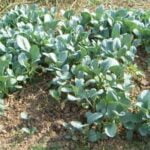Sluggo Plus is a popular choice for gardeners seeking an effective and environmentally friendly solution to pest control in their vegetable gardens. One common question that arises is, “Is Sluggo Plus safe for vegetable gardens?” This article delves into the intricacies of Sluggo Plus, from its composition to application, to help you make an informed decision on whether it’s suitable for your own garden.
Sluggo Plus is a product that combines iron phosphate with spinosad, providing a dual-action approach to targeting pests like slugs, snails, earwigs, and cutworms. The iron phosphate acts as a bait, attracting pests which then consume the active ingredient spinosad. This method proves deadly to the pests while being safe for beneficial insects and animals in your garden.
As we explore the ingredients found in Sluggo Plus and their impact on vegetables, it becomes evident that this product offers a non-toxic alternative to traditional pesticides. Unlike chemical-laden options, Sluggo Plus poses minimal risk to plants and surrounding wildlife while effectively controlling common garden pests. Its natural composition makes it ideal for use in organic gardening practices.
Understanding the Ingredients in Sluggo Plus and Their Impact on Vegetables
Sluggo Plus is a popular option for gardeners looking to control pests in their vegetable gardens while also being mindful of the impact on their crops. One of the key ingredients in Sluggo Plus is iron phosphate, which is considered relatively safe for use around pets and wildlife compared to metaldehyde, a common ingredient in other slug baits. Iron phosphate works by attracting slugs and snails, causing them to stop feeding and eventually die.
Another important ingredient in Sluggo Plus is Spinosad, which is derived from naturally-occurring soil bacteria. Spinosad is known for its effectiveness against a wide range of pests such as caterpillars, leafminers, thrips, and more. It works by affecting the nervous system of insects, ultimately leading to their demise. The combination of iron phosphate and Spinosad in Sluggo Plus provides a dual-action approach to pest control in vegetable gardens.
When using Sluggo Plus in your vegetable garden, it is essential to follow the instructions on the packaging carefully to ensure its effectiveness and safety. Additionally, it is recommended to apply the product in the evening or early morning when slugs and snails are most active. Regular monitoring of your garden after application can help gauge the effectiveness of Sluggo Plus and determine if reapplication is necessary.
| Ingredient | Impact |
|---|---|
| Iron Phosphate | Attracts slugs and snails, stops feeding activity |
| Spinosad | Affects nervous system of insects, leading to demise |
Benefits of Using Sluggo Plus in Vegetable Gardens for Pest Control
Sluggo Plus is a popular choice for many gardeners looking for an effective and safe way to control pests in their vegetable gardens. This organic product combines the power of iron phosphate with Spinosad, a natural insecticide derived from a soil bacterium.
These ingredients work together to target and eliminate common garden pests like slugs, snails, earwigs, and cutworms without harming beneficial insects or other wildlife. Here are some benefits of using Sluggo Plus in your vegetable garden for pest control:
- Safe for vegetables: One of the major advantages of using Sluggo Plus is that it is safe to use on a wide variety of vegetables. Unlike chemical pesticides, Sluggo Plus does not leave harmful residues on your produce, making it an ideal choice for those who prioritize organic gardening practices.
- Effective against multiple pests: Sluggo Plus targets a range of common garden pests, making it a versatile solution for pest control in your vegetable garden. Whether you are dealing with slugs munching on your lettuce or caterpillars attacking your tomatoes, Sluggo Plus can help protect your crops.
- Environmentally-friendly: By choosing to use Sluggo Plus in your vegetable garden, you are opting for an environmentally-friendly pest control option. This product is non-toxic to birds, pets, and wildlife, ensuring that you can maintain a healthy ecosystem in your garden while still effectively managing pests.
Overall, using Sluggo Plus in your vegetable garden can provide peace of mind knowing that you are utilizing a safe and effective solution for controlling pests without compromising the health of your plants or the environment. By following proper application guidelines and precautions, you can enjoy a bountiful harvest while keeping unwanted critters at bay.
Potential Risks and Concerns Associated With Using Sluggo Plus in Vegetable Gardens
Sluggo Plus is generally considered safe for vegetable gardens when used according to the instructions on the label. However, like any product, there are some potential risks and concerns associated with its use. One of the main concerns is that pets or wildlife may consume the pellets, which can be harmful to them. To avoid this, it is important to keep Sluggo Plus out of reach of pets and other animals.
Another risk to consider is the potential impact on beneficial insects in your vegetable garden. While Sluggo Plus targets slugs, snails, and certain types of insects that damage plants, it may also affect non-targeted beneficial insects if not applied carefully. It is important to apply the product only where necessary and avoid overuse to minimize any unintended consequences on beneficial insect populations.
Additionally, some gardeners may be concerned about the active ingredients in Sluggo Plus and their long-term effects on soil health. Before using Sluggo Plus in your vegetable garden, it is recommended to research and understand each ingredient to ensure that they align with your gardening practices and goals.
If you have specific concerns about certain ingredients, consulting with a local gardening expert or extension office can provide valuable insights into whether Sluggo Plus is the right choice for your vegetable garden.
| Concerns | Recommendations |
|---|---|
| Potential harm to pets or wildlife | Keep out of reach and follow label instructions |
| Impact on beneficial insects | Apply only where necessary and avoid overuse |
| Long-term effects on soil health | Research ingredients and consult experts if needed |
How to Apply Sluggo Plus Safely in Your Vegetable Garden
Proper Application of Sluggo Plus
When it comes to using Sluggo Plus in your vegetable garden, proper application is key to ensure the safety of your plants and effectiveness in controlling pests. To begin, make sure to read the label instructions carefully before applying the product. It is recommended to apply Sluggo Plus when the soil is moist and when snails and slugs are actively feeding, usually in the evening or early morning.
Avoid Overapplication
One common mistake that gardeners make is overapplying Sluggo Plus. Remember that this product is effective even in small amounts, so it’s important to use only the recommended dosage. Overapplication can not only be wasteful but also unnecessary and potentially harmful to your vegetable garden.
Protecting Non-Target Species
While Sluggo Plus is safe for use around pets, wildlife, and people, it’s still important to take precautions to protect non-target species. Avoid applying the product near bodies of water or areas where beneficial insects may be present. Additionally, if you have pets that frequent your garden, consider creating barriers or applying the product in areas inaccessible to them.
By following these guidelines for applying Sluggo Plus safely in your vegetable garden, you can effectively control pests without causing harm to your plants or surrounding environment. Remember that consistency is key when it comes to pest control, so continue monitoring your garden regularly and reapply as needed for optimal results.
Tips for Maximizing the Effectiveness of Sluggo Plus in Your Vegetable Garden
Sluggo Plus is a popular choice for gardeners looking to control pests in their vegetable gardens without using harsh chemicals. To ensure that you get the most out of this product, here are some tips for maximizing its effectiveness:
- Apply Sluggo Plus in the evening or on cloudy days: This will help prevent the product from drying out too quickly, ensuring that slugs and snails have a better chance of consuming it.
- Reapply after rainfall: Since Sluggo Plus is made from iron phosphate, it can break down when exposed to water. It’s important to reapply the product after heavy rain to maintain its effectiveness.
- Use Sluggo Plus as part of an integrated pest management plan: While Sluggo Plus is effective at controlling slugs, snails, and other pests, it’s always best to incorporate other methods of pest control as well. This can include hand-picking pests, companion planting, or using physical barriers.
By following these tips, you can ensure that Sluggo Plus remains effective in your vegetable garden while minimizing any potential risks. Remember that proper application and regular monitoring are key to successfully managing pest populations in your garden.
Overall, many gardeners find Sluggo Plus to be a safe and effective option for controlling pests in their vegetable gardens. When used according to the instructions on the label, including proper storage and application techniques, Sluggo Plus can effectively target slugs and snails without harming your vegetables or the environment. It is important to note that while individual sensitivities may vary, this product has generally been deemed safe for use in vegetable gardens by many experts in the field.
Additionally, incorporating good gardening practices such as promoting soil health, practicing crop rotation, and maintaining proper watering schedules can further enhance the overall success of Sluggo Plus in your vegetable garden. By creating a healthy ecosystem within your garden space, you can help support natural pest control methods while utilizing products like Sluggo Plus as a targeted solution when needed.
Alternatives to Sluggo Plus for Pest Control in Vegetable Gardens
In conclusion, while Sluggo Plus is generally considered safe for vegetable gardens when used according to the instructions, there are also alternative methods for pest control that gardeners can consider. These alternatives may offer different benefits and drawbacks compared to Sluggo Plus, providing gardeners with a range of options to choose from based on their preferences and needs.
One common alternative to Sluggo Plus is diatomaceous earth, a natural insecticide that works by dehydrating pests upon contact. Another option is neem oil, derived from the seeds of the neem tree, which has insecticidal properties and can be effective against a variety of garden pests. Additionally, introducing beneficial insects like ladybugs or lacewings into the garden can help control pest populations in a more natural way.
Ultimately, the choice between Sluggo Plus and its alternatives will depend on factors such as the specific pests present in your garden, your gardening practices, and your personal beliefs about pesticide use. It is important to research each option thoroughly and carefully consider how it aligns with your goals for your vegetable garden.
Whether you choose Sluggo Plus or opt for a different method of pest control, always prioritize safety and follow best practices to ensure a healthy and thriving vegetable garden.
Frequently Asked Questions
Is Sluggo Plus Safe for Organic Gardens?
Sluggo Plus is considered safe for organic gardens because it is an OMRI listed product, which means it meets the strict standards for use in organic gardening. It contains iron phosphate as its active ingredient, which breaks down into nutrients that are beneficial to plants.
What Is Difference Between Sluggo and Sluggo Plus?
The main difference between Sluggo and Sluggo Plus is the addition of spinosad in Sluggo Plus. Spinosad is a natural substance derived from soil bacteria that targets certain pests like caterpillars and thrips, making Sluggo Plus more effective against a wider range of garden pests compared to regular Sluggo.
Is Sluggo Harmful to Earthworms?
Sluggo is generally considered safe for earthworms as it specifically targets slugs and snails by interfering with their feeding habits rather than harming them directly. Earthworms are beneficial creatures in the garden, contributing to soil health by breaking down organic matter.

If you’re looking to get into vegetable gardening, or are just looking for some tips on how to make your current garden better, then you’ve come to the right place! My name is Ethel and I have been gardening for years. In this blog, I’m going to share with you some of my best tips on how to create a successful vegetable garden.





